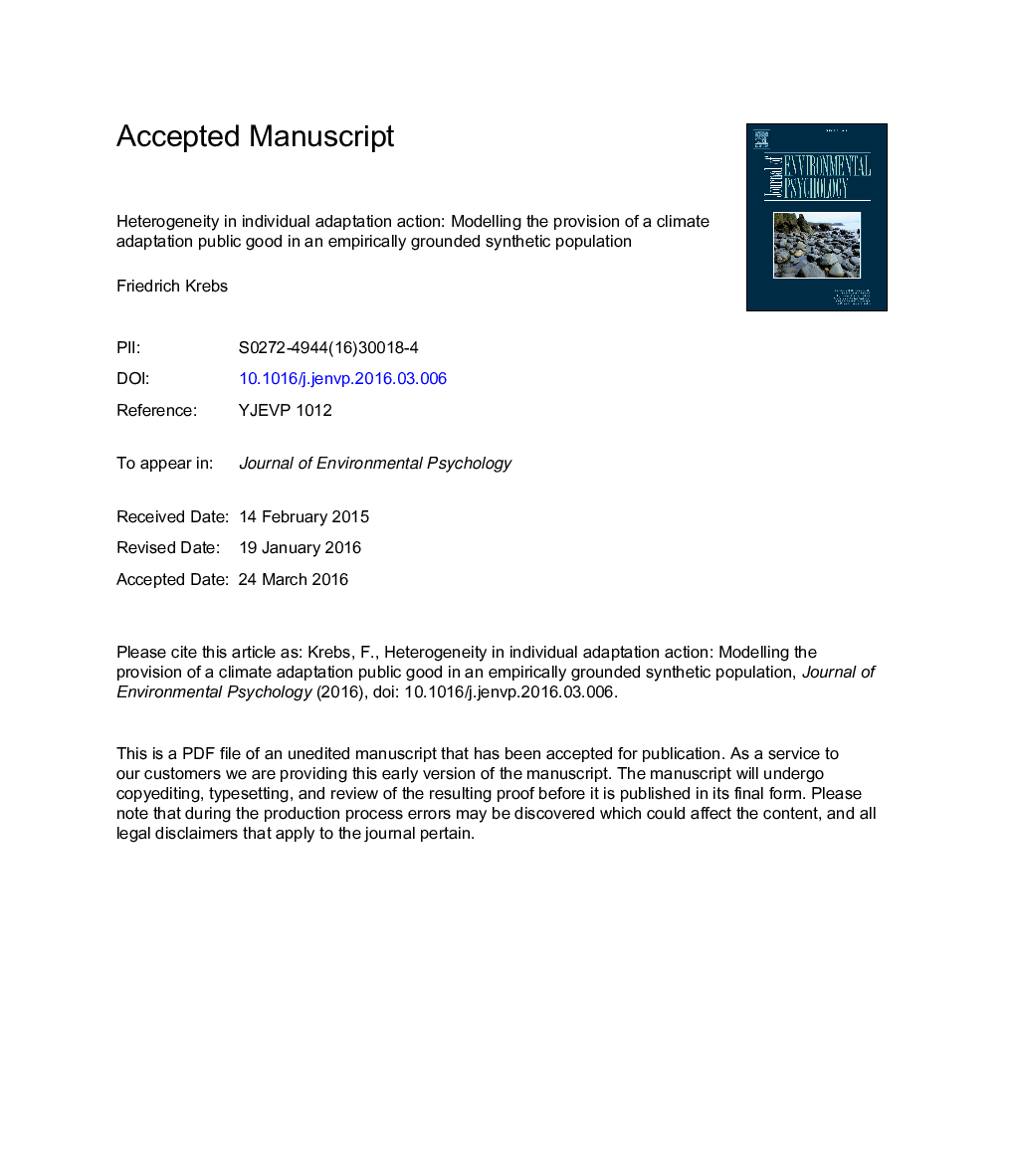| کد مقاله | کد نشریه | سال انتشار | مقاله انگلیسی | نسخه تمام متن |
|---|---|---|---|---|
| 5034898 | 1471742 | 2017 | 44 صفحه PDF | دانلود رایگان |
عنوان انگلیسی مقاله ISI
Heterogeneity in individual adaptation action: Modelling the provision of a climate adaptation public good in an empirically grounded synthetic population
ترجمه فارسی عنوان
عدم همبستگی در اقدام انطباق فردی: مدل سازی ارائه یک سازگاری آب و هوای عمومی در یک جمعیت مصنوعی مبتنی بر تجربی
دانلود مقاله + سفارش ترجمه
دانلود مقاله ISI انگلیسی
رایگان برای ایرانیان
کلمات کلیدی
سازگاری تغییرات اقلیمی، اقدام جمعی، معضل عمومی عمومی، نفوذ اجتماعی، عادت ها، مدل سازی مبتنی بر عامل،
ترجمه چکیده
سازگاری با تغییرات آب و هوایی بستگی به میزان قابل توجهی در تغییر رفتار در قالب اقدام انطباق فردی دارد. ما در مورد احتمال فعال شدن محله های شهری برای حمایت از سالمندان در طول امواج گرمای شدید تولید شده توسط تغییرات آب و هوایی، مورد بررسی قرار می دهیم. در نظر سنجی تطبیقی پیشنهادی، از یک سو مرجع به نظریه معضل اجتماعی و از سوی دیگر مفاهیم از نظریه رفتاری و روانشناسی اجتماعی می شود. زمینه پرونده به ویژه چالش برانگیز است، زیرا این امر مستلزم پویایی درون فردی فرآیندهای روانشناختی، دینامیک بین فردی تأثیر اجتماعی و پویش محیطی است که تحت شرایط سناریوی آینده آب و هوایی قرار دارد. برای تطبیق پویایی فضایی و زمانی بسیج اجتماعی روش پیشنهادی روشمند، مدلسازی مبتنی بر عامل است. آزمایشات شبیه سازی اجتماعی ارائه شده، پایه تجربی خود را از مجموعه ای از داده های اجتماعی-جغرافیایی برای منطقه هدف به دست می دهند که بر اساس شیوه های متداول جامعه شناختی، به شیوه ای متمایز از نظر جمعیتی گروه بندی می کنند. نتایج شبیه سازی نشان می دهد که بسیج اجتماعی حمایت محله می تواند به طور قابل ملاحظه ای مهار شود، زیرا عادت های منفعل سریعتر از رفتارهای اجتماعی که نیاز به هماهنگی هماهنگ اجتماعی دارند قبل از اینکه عادت ایجاد شود، سریع تر می شوند. در مقابل، شبیه سازی سناریوی جایگزین نشان می دهد که یک مداخله محدود با زمان می تواند یک فرصت بزرگ برای فرصت های عادت های تعاونی برای ثبات و تحمل پس از پایان مداخله فراهم کند.
موضوعات مرتبط
علوم انسانی و اجتماعی
روانشناسی
روان شناسی کاربردی
چکیده انگلیسی
Adaptation to climate change depends to a significant extent on behavioural change in the form of individual adaptation action. We investigate the case of urban neighbourhood activation for the support of the elderly during the more likely occurring extreme heat waves generated by climate change. The proposed integrative theoretical consideration makes on the one hand reference to social dilemma theory and on the other to concepts from behavioural theory and social psychology. The case context is particularly challenging because it involves intra-individual dynamics of psychological processes, inter-individual dynamics of social influence and environmental dynamics governed by future climate scenarios. To account for the spatial and temporal dynamics of social mobilisation the proposed methodical approach is agent-based modelling. The presented social simulation experiments obtain their empirical grounding from a fine grained set of socio-geographic data for the target area which groups the population according to sociological lifestyles in a spatially explicit way. Simulation results show that social mobilisation of neighbourhood support can be substantially inhibited because passive habits establish quicker than prosocial behaviours which require successful social coordination prior to becoming habitual. In contrast, an alternative scenario simulation reveals that a time-limited intervention can provide an enlarged temporal window of opportunity for cooperative habits to stabilise and to persist after the end of the intervention.
ناشر
Database: Elsevier - ScienceDirect (ساینس دایرکت)
Journal: Journal of Environmental Psychology - Volume 52, October 2017, Pages 119-135
Journal: Journal of Environmental Psychology - Volume 52, October 2017, Pages 119-135
نویسندگان
Friedrich Krebs,
